- Home
- Leigh Bardugo
King of Scars Page 3
King of Scars Read online
Page 3
“Even my charm has its limits, Zoya.”
If so, she had yet to encounter them. Zoya cast the king a disbelieving glance. “A handsome monster husband who put a crown on her head? It’s a perfect fairy tale to sell to some starry-eyed girl. She can lock you in at night and kiss you sweetly in the morning, and Ravka will be secure.”
“Why do you never kiss me sweetly in the morning, Zoya?”
“I do nothing sweetly, Your Highness.” She shook out her cuffs. “Why do you hesitate? Until you marry, until you have an heir, Ravka will remain vulnerable.”
Nikolai’s glib demeanor vanished. “I cannot take a wife while I am in this state. I cannot forge a marriage founded on lies.”
“Aren’t most?”
“Ever the romantic.”
“Ever practical.”
“Kerch bridal prospects aside, we need to escape before Schenck can question me more closely about the izmars’ya.”
Zoya cursed. “So the twins were right—there was a leak at our old research facility.” The izmars’ya were ships that traveled beneath the surface of the water. They would be vital to Ravka’s survival as the Fjerdan navy grew, especially if Nikolai could arm them as he had planned.
“It seems so. But the Kerch don’t know how far along we are, at least not yet.”
Those words did little to cheer Zoya. The Kerch already had enough leverage against Ravka. Schenck wouldn’t have raised the topic of the izmars’ya with the king lightly. What did he intend to do with this new intelligence?
Another sharp whistle sounded from outside the carriage, two quick notes—Tolya’s signal that they were approaching the gatehouse.
Zoya knew there would be some confusion among the guards. No one had seen the coach ride out, and it bore no royal seal. Tolya and Tamar had kept it at the ready well outside the duke’s estate just in case Nikolai slipped his leash. She’d gone to find them as soon as she realized he was missing.
They’d gotten lucky tonight. They’d found the king before he’d strayed too far. When Nikolai flew, Zoya could sense him riding the winds and use the disruption in their pattern to track his movements. But if she hadn’t gotten to that farm when she had, what might have happened? Would Nikolai have killed that boy? The thing inside him was not just a hungry animal but something far worse, and she knew with absolute surety that it longed for human prey.
“We cannot go on this way, Nikolai.” Eventually they would be found out. Eventually these evening hunts and sleepless nights would get the best of them. “We must all do what is required.”
Nikolai sighed and opened his arms to her as the coach rattled to a stop. “Then come here, Zoya, and kiss me sweetly as a new bride would.”
So much for propriety. Thanks to Zoya’s late-night visits to make sure the king was safely restrained in his chambers, the gossip was already thick that their relationship was more than political. Kings took mistresses, and worse things had been rumored about leaders before. Zoya just hoped the Schenck girls were the open-minded sort. The king’s reputation could withstand a bit of scandal; it would not survive the truth.
Zoya took a second flask from the pack and dabbed whiskey at her pulse points like perfume before handing it to Nikolai, who took a long swig, then splashed the rest liberally over his coat. Zoya ruffled her hair, let her kefta slip from one shoulder, and eased into the king’s arms. The charade was necessary, and it was an easy role to play, sometimes too easy.
He buried his face in her hair, inhaling deeply. “How is it I smell like goose shit and cheap whiskey and you smell like you just ran through a meadow of wildflowers?”
“Ruthlessness.”
He breathed in again. “What is that scent? It reminds me of something, but I can’t place what.”
“The last child you tried to eat?”
“That must be it.”
The door to the coach flew open.
“Your Highness, we hadn’t realized you’d gone out tonight.”
Zoya couldn’t see the guard’s face, but she could hear the suspicion in his voice.
“Your king is not in the habit of asking for anything, least of all permission,” said Nikolai, his voice lazy but with the disdainful edge of a monarch who knew nothing but easy gratification.
“Of course, of course,” said the guard. “We had only your safety in mind, my king.”
Zoya doubted it. Western Ravka had bridled under the new taxes and laws that had come with unification. These guards might wear the double eagle, but their loyalty belonged to the duke who ran this estate and who had thrown up opposition to Nikolai’s rule at every turn. No doubt their master would be thrilled to uncover the king’s secrets.
Zoya summoned her most plaintive tone and said, “Why aren’t we moving?”
She sensed the shift in their interest.
“A good night, then?” said the guard, and she could almost see him peering into the coach to get a better look.
Zoya tossed her long black hair and said with the sleepy, tousled sound of a woman well tumbled, “A very good night.”
“She only play with royals?” said the guard. “She looks like fun.”
Zoya felt Nikolai tense. She was both touched and annoyed that he thought she cared what some buffoon believed, but there was no need to play at chivalry tonight.
She cast the guard a long look and said, “You have no idea.” He chortled and waved them through.
As the coach rolled on, Zoya felt the faint tremor of Nikolai’s transformation still echoing through him and her own exhaustion creeping over her. It would be too easy to let her eyes close, to rest her head against his chest and give in to the illusion of comfort. But the price for such indulgence would be too high. “Eventually the monster will be found out,” she said. “We’ve had no luck in finding a cure or even a hint of one. Marry. Forge an alliance. Make an heir. Secure the throne and Ravka’s future.”
“I will,” he said wearily. “I’ll do all of it. But not tonight. Tonight let’s pretend we’re an old married couple.”
If any other man had said such a thing, she would have punched him in the jaw. Or possibly taken him to bed for a few hours. “And what does that entail?”
“We’ll tell each other lies as married couples do. It will be a good game. Go on, wife. Tell me I’m a handsome fellow who will never age and who will die with all of his own teeth in his head. Make me believe it.”
“I will not.”
“I understand. You’ve never had a talent for deception.”
Zoya knew he was goading her, but her pride pricked anyway. “How can you be so sure? Perhaps the list of my talents is so long you just haven’t gotten to the end.”
“Go on, then, Nazyalensky.”
“Dearest husband,” she said, making her voice honey sweet, “did you know the women of my family can see the future in the stars?”
He huffed a laugh. “I did not.”
“Oh yes. And I’ve seen your fate in the constellations. You will grow old, fat, and happy, father many badly behaved children, and future generations will tell your story in legend and song.”
“Very convincing,” Nikolai said. “You’re good at this game.” A long silence followed, filled with nothing but the rattling of the coach wheels. “Now tell me I’ll find a way out of this. Tell me it will be all right.”
His tone was merry, teasing, but Zoya knew him too well. “It will be all right,” she said with all the conviction she could muster. “We’ll solve this problem as we’ve solved all the others before.” She tilted her head up to look at him. His eyes were closed; a worried crease marred his brow. “Do you believe me?”
“Yes.”
She pushed away from him and straightened her clothes. Falsehoods were inevitable, maybe even necessary between a husband and wife. A general and her king could ill afford them.
“See?” she said. “You’re good at this game too.”
3
NINA
NINA CLUTCHED HER KNIFE and t
ried to ignore the carnage that surrounded her. She looked down at her victim, another body splayed out helpless before her.
“Sorry, friend,” she murmured in Fjerdan. She drove her blade into the fish’s belly, yanked up toward its head, seized the wet pink mess of its innards, and tossed them onto the filthy slats where they would be hosed away. The cleaned carcass went into a barrel to her left, to be cleared by one of the runners and taken off for packaging. Or processing. Or pickling. Nina had no idea what actually happened to the fish, and she didn’t much care. After two weeks working at a cannery overlooking the Elling harbor, she didn’t intend to eat anything with scales or fins ever again.
Imagine yourself in a warm bath with a dish full of toffees. Maybe she’d just fill the bathtub with toffee and be really decadent about the endeavor. It could become quite the rage. Toffee baths and waffle scrubs.
Nina gave her head a shake. This place was slowly driving her mad. Her hands were perpetually pruned, the skin nicked by tiny cuts from her clumsy way with the filleting knife; the smell of fish never left her hair; and her back ached from being on her feet in front of the cannery from dawn until dusk, rain or shine, protected from the elements by nothing but a corrugated tin awning. But there weren’t many jobs for unmarried women in Fjerda, so Nina—under the name Mila Jandersdat—had gladly taken the position. The work was grueling but made it easy for their local contact to get her messages, and her vantage point among the fish barrels gave her a perfect view of the guards patrolling the harbor.
There were plenty of them today, roaming the docks in their blue uniforms. Kalfisk, the locals called them—squid—because they had their tentacles in everything. Elling sat where the Stelge River met the Isenvee, and it was one of the few harbors along Fjerda’s rocky northwest coast with easy access to the sea for large vessels. The port was known for two things: smuggling and fish. Coalfish, monkfish, haddock; salmon and sturgeon from the river cities to the east; tilefish and silver-sided king mackerel from the deep waters offshore.
Nina worked beside two women—a Hedjut widow named Annabelle, and Marta, a spinster from Djerholm who was as narrow as a gap in the floorboards and constantly shook her head as if everything displeased her. Their chatter helped to keep Nina distracted and was a welcome source of gossip and legitimate information, though it could be hard to tell the difference between the two.
“They say Captain Birgir has a new mistress,” Annabelle would begin.
Marta would purse her lips. “With the bribes he takes he can certainly afford to keep her.”
“They’re increasing patrols since those stowaways were caught.”
Marta would cluck her tongue. “Means more jobs but probably more trouble.”
“More men in from Gäfvalle today. River’s gone sour up by the old fort.”
Marta’s head would twitch back and forth like a happy dog’s tail. “A sign of Djel’s disfavor. Someone should send a priest to say prayers.”
Gäfvalle. One of the river cities. Nina had never been there, had never even heard of it until she’d arrived with Adrik and Leoni two months ago on orders from King Nikolai, but its name always left her uneasy, the sound of it accompanied by a kind of sighing inside her, as if the town’s name was less a word than the start of an incantation.
Now Marta knocked the base of her knife against the wooden surface of her worktable. “Foreman coming.”
Hilbrand, the stern-faced foreman, was moving through the rows of stalls, calling out to runners to remove the buckets of fish.
“Your pace is off again,” he barked at Nina. “It’s as if you’ve never gutted fish before.”
Imagine that. “I’m sorry, sir,” she said. “I’ll do better.”
He cut his hand through the air. “Too slow. The shipment we’ve been waiting for has arrived. We’ll move you to the packing room floor.”
“Yes, sir,” Nina said glumly. She dropped her shoulders and hung her head when what she really wanted to do was break into song. The pay for packing jobs was considerably lower, so she had to make a good show of her defeat, but she’d understood Hilbrand’s real message: The last of the Grisha fugitives they’d been waiting for had made it to the Elling safe house at last. Now it was up to Nina, Adrik, and Leoni to get the seven newcomers aboard the Verstoten.
She followed close behind Hilbrand as he led her back toward the cannery.
“You’ll have to move quickly,” he said without looking at her. “There’s talk of a surprise inspection tonight.”
“All right.” An obstacle, but nothing they couldn’t handle.
“There’s more,” he said. “Birgir is on duty.”
Of course he is. No doubt the surprise inspection was Captain Birgir’s idea. Of all the kalfisk, he was the most corrupt but also the sharpest and most observant. If you wanted a legal shipment to get through the harbor without being trapped forever in customs—or if you wanted an illegal bit of cargo to avoid notice—then a bribe for Birgir was the cost.
A man without honor, said Matthias’ voice in her head. He should be ashamed.
Nina snorted. If men were ashamed when they should be, they’d have no time for anything else.
“Is something amusing?” Hilbrand asked.
“Just fighting a cold,” she lied. But even Hilbrand’s gruff manner put a pang in her heart. He was broad-shouldered and humorless and reminded her painfully of Matthias.
He’s nothing like me. What a bigot you are, Nina Zenik. Not all Fjerdans look alike.
“You know what Birgir did to those stowaways,” Hilbrand said. “I don’t have to tell you to be careful.”
“No, you don’t,” Nina said more sharply than she meant to. She was good at her job, and she knew exactly what was at stake. Her first morning at the docks, she’d seen Birgir and one of his favorite thugs, Casper, drag a mother and daughter off a whaler bound for Novyi Zem and beat them bloody. The captain had hung heavy chains around their necks weighted with signs that read drüsje—witch. Then he’d doused them in a slurry of waste and fish guts from the canneries and bound them outside the harbor station in the blazing sun. As his men looked on, laughing, the stink and the promise of food drew the gulls. Nina had spent her shift watching the woman trying to shield her daughter’s body with her own, and listening to the prisoners cry out in agony as the gulls pecked and clawed at their bodies. Her mind had spun a thousand fantasies of murdering Birgir’s harbor guards where they stood, of whisking the mother and daughter to safety. She could steal a boat. She could force a ship’s captain to take them far away. She could do something.
But she’d remembered too clearly Zoya’s warning to King Nikolai about Nina’s suitability for a deep-cover mission: “She doesn’t have a subtle bone in her body. Asking Nina not to draw attention is like asking water not to run downhill.”
The king had taken a chance on Nina, and she would not squander the opportunity. She would not jeopardize the mission. She would not compromise her cover and put Adrik and Leoni at risk. At least not in broad daylight. As soon as the sun had set, she’d slipped back to the harbor to free the prisoners. They were gone. But to where? And to suffer what horrors? She no longer believed that the worst terror awaiting Grisha at the hands of Fjerdan soldiers was death. Jarl Brum and his witchhunters had taught her too well.
As Nina followed Hilbrand into the cannery, the grind of machinery rattled her skull, the stink of salt cod overwhelming her. She wouldn’t be sorry to leave Elling for a while. The hold of the Verstoten was full of Grisha that her team—or Adrik’s team, really—had helped rescue and bring to Elling. Since the end of the civil war, King Nikolai had diverted funds and resources to support an underground network of informants that had existed for years in Fjerda with the goal of helping Grisha living in secret to escape the country. They called themselves Hringsa, the tree of life, after the great ash sacred to Djel. Nina knew Adrik had already received new intelligence from the group, and once the Verstoten was safely on its way to Ravka, Nina and t
he others would be free to head inland to locate more Grisha.
Hilbrand led her to his office, shut the door behind them, then ran his fingers along the far wall. A click sounded and a second, hidden door opened onto the Fiskstrahd, the bustling street where fishmongers did their business and where a girl on her own might avoid the notice of the harbor police by simply disappearing into the crowd.
“Thank you,” Nina said. “We’ll be sending more your way soon.”
“Wait.” Hilbrand snagged her arm before she could slip into the sunshine. He hesitated, then blurted out, “Are you really her? The girl who bested Jarl Brum and left him bleeding on a Djerholm dock?”
Nina yanked her arm from his grip. She’d done what she had to do to free her friends and keep the secret of jurda parem out of Fjerdan hands. But it was the drug that had made victory possible, and it had exacted an awful price, changing the course of Nina’s life and the very nature of her Grisha power.
If we’d never gone to the Ice Court, would Matthias still be alive? Would my heart still be whole? Pointless questions. There was no answer that would bring him back.
Nina fixed Hilbrand with the withering glare she’d learned from Zoya Nazyalensky herself. “I’m Mila Jandersdat. A young widow taking odd jobs to make ends meet and hoping to secure work as a translator. What kind of fool would pick a fight with Commander Jarl Brum?” Hilbrand opened his mouth, but Nina continued, “And what kind of podge would risk compromising an agent’s cover when so many lives are on the line?”
Nina turned her back on him and waded into the human tide. Dangerous. A man who lived his life in deep cover shouldn’t be so careless. But Nina knew that loneliness could make you foolish, hungry to speak something other than lies. Hilbrand had lost his wife to Brum’s men, the ruthless drüskelle trained to hunt and kill Grisha. Since then, he’d become one of King Nikolai’s most trusted operatives in Fjerda. Nina didn’t doubt his loyalty, and his own safety relied on his discretion.
It took Nina less than ten minutes to reach the address Hilbrand had given her, another cannery identical to the buildings bracketing it—except for the mural on its western side. At first glance, it looked like a pleasant scene set at the mouth of the Stelge: a group of fishermen casting their nets into the sea as happy villagers looked on beneath a setting sun. But if you knew what to look for, you might notice the white-haired girl in the crowd, her profile framed by the sun as if by a halo. Sankta Alina. The Sun Summoner. A sign that this warehouse was a place of refuge.

 The Language of Thorns: Midnight Tales and Dangerous Magic
The Language of Thorns: Midnight Tales and Dangerous Magic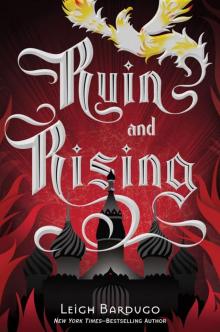 Ruin and Rising
Ruin and Rising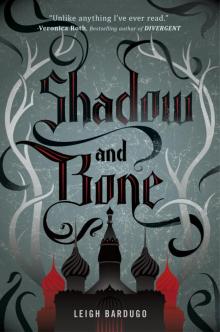 Shadow and Bone
Shadow and Bone The Demon in the Wood
The Demon in the Wood King of Scars
King of Scars Ninth House
Ninth House Six of Crows
Six of Crows The Tailor
The Tailor Crooked Kingdom
Crooked Kingdom The Too-Clever Fox
The Too-Clever Fox The Witch of Duva
The Witch of Duva Siege and Storm
Siege and Storm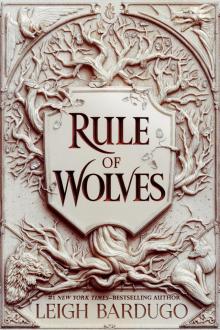 Rule of Wolves
Rule of Wolves Little Knife
Little Knife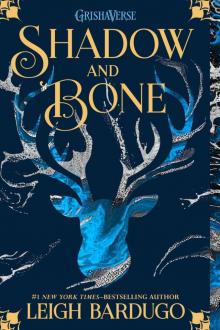 Grishaverse 01 - Shadow and Bone
Grishaverse 01 - Shadow and Bone The Lives of Saints
The Lives of Saints Grishaverse 01.5 - The Tailor
Grishaverse 01.5 - The Tailor Grishaverse 0.5 - The Language of Thorns
Grishaverse 0.5 - The Language of Thorns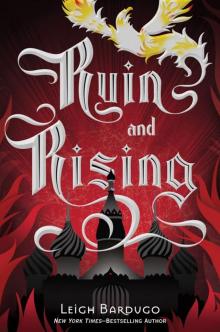 Ruin and Rising (The Grisha Trilogy)
Ruin and Rising (The Grisha Trilogy)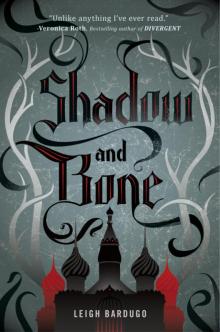 Shadow and Bone gt-1
Shadow and Bone gt-1 Wonder Woman: Warbringer
Wonder Woman: Warbringer Grisha 02 - Siege and Storm
Grisha 02 - Siege and Storm The Language of Thorns
The Language of Thorns Grisha 00: The Witch of Duva
Grisha 00: The Witch of Duva Siege and Storm gt-2
Siege and Storm gt-2 Shadow and Bone (Grisha Trilogy)
Shadow and Bone (Grisha Trilogy)